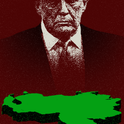The front page of the New York Times on the morning of 13th December 2000 announced that the US Supreme Court had awarded a closely contested presidential election to George W Bush. The banner headline proclaimed: BUSH PREVAILS. The editors who had huddled in the newsroom the night before thought we were being rather clever. By avoiding the word “WIN”, we meant to cast a bit of a shadow over the legitimacy of the outcome. After all, Bush had lost the popular count to Al Gore by half a million votes and had only defeated Gore in the electoral college thanks to an egregious example of judicial overreach.
A quarter of a century later it is not difficult to imagine a sequel in which a Supreme Court stacked with Maga sympathisers delivers the White House to a would-be autocrat: TRUMP PREVAILS. Donald Trump has predicted that the 5th November election—which polls show to be a toss-up—will be ultimately decided in the Supreme Court, where he has a like-minded 6-3 majority. Trump and most of his compliant fellow Republicans have made election denial a litmus test of party loyalty, refusing to concede that he lost the election in 2020 or to commit to accepting defeat in 2024.
The Supreme Court ruling in 2000 hinged on the Constitution’s Fourteenth Amendment, which guarantees equal rights of citizenship to anyone born or naturalised in the United States. The amendment’s main purpose when it was enacted after the Civil War was to enfranchise descendants of enslaved African Americans, but the ruling in Bush v Gore entailed a more creative interpretation.
When the machine-tabulated ballots gave Bush a narrow advantage, Gore’s lawyers sued for a statewide manual recount. After weeks of legal wrangling the highest Florida state court ordered the ballots be examined by hand to discern the “clear intent of the voter”. With an important deadline looming and no consistent standard of how to measure “clear intent”, Bush asked the Supreme Court to intervene. Democrats pointed out that the mechanics of elections were the prerogative of legislators, not judges, but the court ruled 5 to 4 to declare the counting over. This effectively awarded the state’s 25 electoral votes—and the presidency—to the Republican. Two US news organisations—the Washington Post and the Palm Beach Post—later commissioned unofficial counts of the disputed Florida ballots and concluded that if they had been properly counted Gore would have won Florida, and the White House, by a narrow margin. But by then the court had had the final word.
One member of the Bush v Gore majority, Justice Sandra Day O’Connor, later admitted misgivings about the outcome. Another, Antonin Scalia, reportedly said in private that the application of the Fourteenth Amendment in Bush v Gore was, “as we say in Brooklyn, a piece of shit”. Indeed, the majority in the case seemed somewhat ambivalent about its own reasoning, declaring that the ruling was “limited to the present circumstances”—which has been widely read to mean the opinion should not be treated as a binding precedent in subsequent election disputes.
“Bush v Gore is the Lord Voldemort of Supreme Court jurisprudence—the case that must not be named,” wrote David A Kaplan, the author of a book on the case called The Accidental President. Voldemort or not, Bush v Gore has been cited hundreds of times in lower courts, sometimes to disqualify votes, sometimes to prevent votes from being arbitrarily discounted.
Only one member of the Supreme Court majority that cut short the Florida recount, the ultraconservative Clarence Thomas, remains on the court today, but it is not hard to guess how the others would vote in a replay. Three of the current justices—Bush appointee John Roberts and Trump appointees Brett Kavanaugh and Amy Coney Barrett—were part of an army of private lawyers mobilised in 2000 by the libertarian Federalist Society to support the Republicans on their strategy in Bush v Gore. Two others, Samuel Alito and Neil Gorsuch, are Federalist proteges. The court’s six Republican appointees have done Trump’s bidding in a wide range of cases, repealing abortion rights, rolling back voting safeguards, weakening the authority of federal regulators, and—most disturbingly—asserting that presidents enjoy immunity from prosecution for crimes committed in the course of their official duties.
Thanks in part to those rulings, and in part to revelations of justices taking freebies from wealthy friends with interests before the courts, public trust in the US Supreme Court has declined sharply. More than half of Americans—and even larger majorities of Democrats, young Americans and black voters—tell pollsters they view the Supreme Court unfavourably.
President Biden and Vice President Kamala Harris have seized the moment to propose court reforms including term limits, stricter ethics rules and a constitutional amendment denying presidents immunity from criminal prosecution. But Republican leaders in Congress have declared the reforms “dead on arrival”, and they are probably right. The last serious attempt to dilute the powers of the Supreme Court was in 1937, when President Franklin D Roosevelt set out to protect his New Deal programmes from judicial attack by expanding the number of justices. The proposal died in the Senate Judiciary Committee, which declared the measure “an invasion of judicial power such as has never before been attempted in this country” and concluded that FDR’s court-packing scheme “is a measure which should be so emphatically rejected that its parallel will never again be presented to the free representatives of the free people of America”.
The Supreme Court has already had a hand in this year’s election. The justices postponed the damaging spectacle of Trump’s criminal trial until after election day, ruled that his attempts to overturn the 2020 election may be immune from prosecution, and blocked states from denying him a place on their ballots for his role in the Capitol insurrection. In a 2023 case in North Carolina, Moore v Harper, the justices asserted their claim to the final word on disputed state election rules. (Bush v Gore was invoked 13 times in the Supreme Court hearing on that case.) Meanwhile, Republicans in several battleground states have been erecting impediments to the ballot box—enacting onerous voter ID laws, cutting poll hours, purging voter rolls, and encouraging partisan volunteers to play watchdog over poll workers.
This time, it won’t just be Florida.












